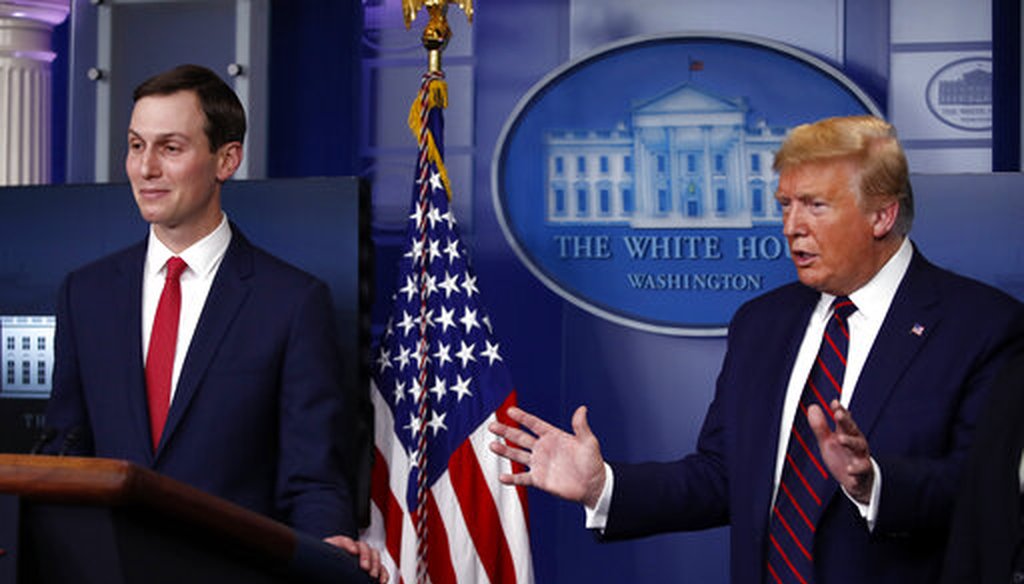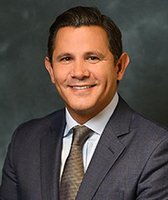Stand up for the facts!
Our only agenda is to publish the truth so you can be an informed participant in democracy.
We need your help.
I would like to contribute

President Donald Trump speaks about the coronavirus in the James Brady Press Briefing Room of the White House, Thursday, April 2, 2020, in Washington, as White House adviser Jared Kushner listens. (AP)
If Your Time is short
-
The Strategic National Stockpile was created in 1999 and has provided medicine and supplies to states in response to to biological threats, terrorism and disasters.
-
Kushner said the stockpile was “not supposed to be state stockpiles,” but he also said the federal government would send supplies to the states that are in the most need.
-
After Kushner’s comments, the federal government changed the language describing the national stockpile.
-
Neither the federal government nor states appear to be adequately prepared for a response to a pandemic. The finger pointing has started, experts said.
In a White House COVID-19 briefing, Jared Kushner picked up on President Donald Trump’s theme that the states should do more to obtain medical supplies rather than rely on the federal stockpile.
"You also have a situation where in some states, FEMA allocated ventilators to the states and you have instances where in cities they’re running out, but the state still has a stockpile and the notion of the federal stockpile was, it’s supposed to be our stockpile," said Kushner, Trump’s son-in-law and adviser, April 2. "It’s not supposed to be state stockpiles that they then use."
Read in isolation, Kushner’s statement sounded like he wasn’t familiar with the purpose of the national stockpile, which is clearly to help states in an emergency. (At the time, the website about the stockpile flatly contradicted him.)
But Kushner made other comments during the press conference that showed he knows the national stockpile is used to help provide states with supplies such as masks or ventilators. Kushner’s point was that local officials are requesting items that they don’t need.
For example, Kushner said a hospital asked a congressman for 250 ventilators even though there were no COVID-19 patients in the counties near that hospital.
"So, what you have all over the country is a lot of people are asking for things that they don’t necessarily need at the moment," he said.
Kushner added that the job of the federal government is to make sure it gets real data from cities and states so "that we can make real-time allocation decisions based on the data."
Kushner’s comments about the federal stockpile prompted critics to note that the federal government’s own description of the national stockpile stated that when "state, local, tribal, and territorial responders request federal assistance to support their response efforts, the stockpile ensures that the right medicines and supplies get to those who need them most during an emergency." By the next day, the federal government changed its online description of the stockpile.
Ali Khan, a University of Nebraska epidemiologist and former director of the Office of Public Health Preparedness and Response, called Kushner’s comments a "semantics issue."
"Cities, counties, states and the nations have a cascading responsibility for disasters," he said. "For all emergencies you deplete local resources and recruit new resources in an escalating hierarchy before going to the feds."
The Strategic National Stockpile was first created in 1999 and started out in response to preparing for chemical, radiological, biological or nuclear attacks. It expanded to respond to terrorism attacks, hurricanes, the H1N1 flu and ebola.
The location of the $8 billion stockpile is secret.
When we looked on the morning of April 3, the U.S. Department of Health and Human Services website described the stockpile this way: "Strategic National Stockpile is the nation’s largest supply of life-saving pharmaceuticals and medical supplies for use in a public health emergency severe enough to cause local supplies to run out. When state, local, tribal, and territorial responders request federal assistance to support their response efforts, the stockpile ensures that the right medicines and supplies get to those who need them most during an emergency."
Later that same day, the language on the website’s homepage was changed to emphasize the states’ roles in finding their own supplies:
"The Strategic National Stockpile's role is to supplement state and local supplies during public health emergencies. Many states have products stockpiled, as well. The supplies, medicines, and devices for life-saving care contained in the stockpile can be used as a short-term stopgap buffer when the immediate supply of adequate amounts of these materials may not be immediately available."
The Department of Health and Human Services said federal officials began working to update that language a week earlier to explain the role of the stockpile, and that it had used that language when communicating with the press for weeks.
We have no way of independently verifying when federal officials first started working to update the description of the stockpile. However, HHS did provide a similar statement to the Washington Post in March.
The entire purpose of the federal stockpile is to provide supplies to state and localities, said Ellen Carlin, a professor at Georgetown University’s Center for Global Health Science and Security.
Kushner might have been intending to say the federal stockpile is meant to complement state stockpiles, she said.
"There has been discussion around this lately, with some arguing that it is not the federal government’s job alone to ensure that states have the supplies they need in an emergency," she said. "This is true."
But the reality is that state budget deficits combined with the dire state of public health for over a decade makes state stockpiles a limited reality, she said.
"While states do bear responsibility for preparedness, it is truly difficult to imagine, with their squeezed public health budgets, that they would fund what is a very expensive venture of creating and sustaining a stockpile big enough for a state-wide pandemic," she said. "The federal government’s purchasing power is second to none, and it should have been leveraging that power much more significantly. Fiscally, it doesn’t make much sense for 50 states to each negotiate with companies for supplies — prices could go through the roof."
The federal government knew that states would not have their own stockpiles to deal with such an emergency, and "now they are trying to cast the blame elsewhere," she said.
Former government officials have said the national stockpile can’t provide all of the supplies, which are based on the funding provided by Congress.
"The Strategic National Stockpile is not designed to be the sole solution to these problems," Greg Burel, who directed the stockpile program for more than 12 years until he retired in January, told NBC News.
Tara O'Toole, a former homeland security official, told NPR that the stockpile can never be big enough to replace the supply chains.
"It's a bridge," she says. "It's not a replacement for the private sector."
The COVID-19 pandemic has shown the weaknesses of the stockpile and the competing demands.
RELATED: Federal pandemic money fell for years. Trump’s budgets didn’t help
Daniel Gerstein, an expert in biodefense at Rand Corp. who previously worked at Homeland Security, told PolitFact that in such an emergency, local government responds first, and when their capacity is exceeded, the states provide support. When the state capacity is exhausted, states can ask the federal government for support.
"In fact, the states and locals have come to depend on the Strategic National Stockpile as a means of support," he said.
Trump told governors in mid March that they should order their own supplies. In the press conference with Kushner, Trump continued on that theme and said that while the federal government has been providing supplies, "We’re a backup. We’re not an ordering clerk. We’re a back up, and we’ve done an unbelievable job."
Many governors have said they did follow Trump’s directive starting in March to order supplies on their own, but ended up in bidding wars with other states or the federal government.
Our Sources
Rev.com, President Donald Trump, White House coronavirus task force briefing, April 2, 2020
U.S. Department of Health and Human Services, Response to the COVID-19 Pandemic, April 3, 2020
U.S. Department of Health and Human Services, Strategic National Stockpile: A Look Back at the Last 20 Years, Oct. 17, 2019
U.S. Department of Health and Human Services, Tweet, April 3, 2020
U.S. Department of Health and Human Services, Strategic National Stockpile, April 3, 2020
Washington Post, Inside the secret U.S. stockpile meant to save us all in a bioterror attack, April 24, 2018
National Academies, The Nation's Medical Countermeasure Stockpile: Opportunities to Improve the Efficiency, Effectiveness, and Sustainability of the CDC Strategic National Stockpile: Workshop Summary, Oct. 24, 2016
NPR, Why Even A Huge Medical Stockpile Will Be Of Limited Use Against COVID-19, March 14, 2020
NBC, Why the Strategic National Stockpile isn't meant to solve a crisis like coronavirus, March 28, 2020
Washington Post, The Trump administration just changed its description of the national stockpile to jibe with Jared Kushner’s controversial claim, April 3, 2020
Washington Post, Face masks in national stockpile have not been substantially replenished since 2009, March 10, 2020
Huffington Post, Jared Kushner Ripped For Saying ‘Our Stockpile’ Isn’t Meant For States To Use, April 3, 2020
U.S. Department of Health and Human Services, Statement to PolitiFact, April 3, 2020
Email interview, Daniel Gerstein, currently senior policy researcher at the RAND Corporation and Under Secretary (Acting) and Deputy Under Secretary for Science & Technology, Department of Homeland Security (Aug 2011-Apr 2014), April 3, 2020
Email interview, Ellen Carlin, a professor at the Georgetown University’s Center for Global Health Science and Security, April 3, 2020
Email interview, Ali Khan, University of Nebraska professor, April 3, 2020
































